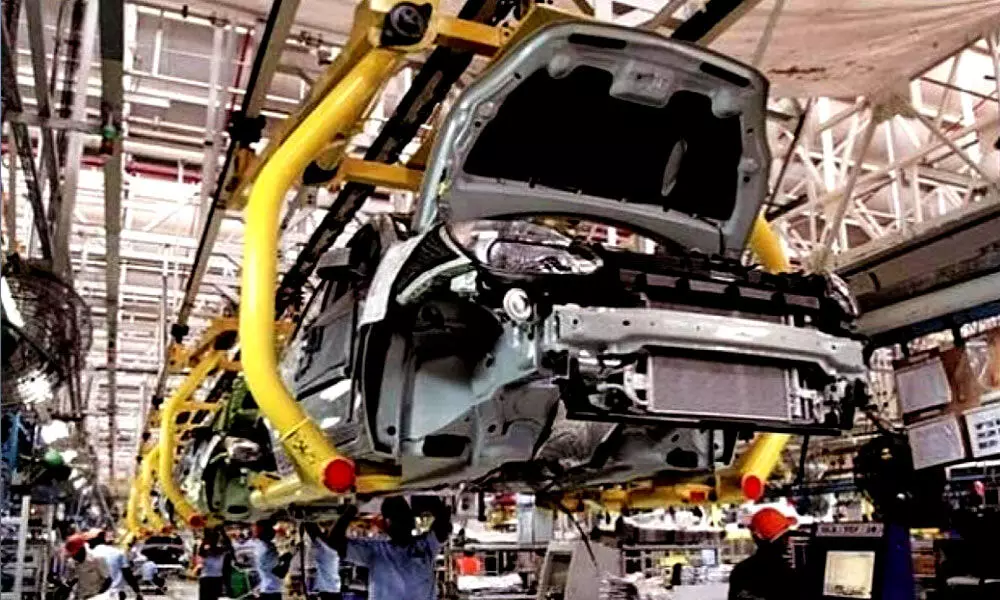ACMA seeks lower GST on auto components
Asks for a uniform GST rate of 18% on all auto parts to curb the impact of counterfeits in the aftermarket operations
image for illustrative purpose

Budget wishlist
• Asks govt to consider upward vision of RoDTEP
• Lower RoDTEP rate is deterring the competitiveness
• Grey operations and counterfeits alarmingly high due to 28% GST
• Facilitating investments for capacity building and encouraging R&D and new product development will be steps in the right direction by the govt
New Delhi: Auto components industry body ACMA on Tuesday said it has urged the government for a uniform GST rate of 18 per cent on all auto parts to curb the impact of counterfeits in the aftermarket operations.
In its pre-Budget recommendations, the Automotive Component Manufacturers Association (ACMA) also asked the government to consider upward vision of RoDTEP (Remission of Duties and Taxes on Export Products) rates as the rate notified for the sector at 1 per cent or lower is inadequate to cover the incidence of unrefunded taxes and duties borne on export products.
"The auto component industry, being an intermediary, has recommended for a uniform GST rate of 18 per cent on all auto components," ACMA President Sunjay Kapur said in a statement. The industry has significant aftermarket operations that are plagued by grey operations and counterfeits due to the high 28 per cent GST rate, he added.
"A moderate rate of 18 per cent will not only address this challenge but will also enhance the tax base through better compliance," Kapur said. With the focus of the government on environment, energy security and vehicular safety, he said it is imperative for the auto components industry to invest in newer technologies and create capacities to meet the growing domestic demand for such products. "Facilitating investments for capacity building and encouraging R&D and new product development will be steps in the right direction by the government," Kapur added.
He also welcomed the government's policy announcements on the production linked incentive (PLI) schemes for ACC (advanced chemistry cell) battery, auto and auto components, and extension of FAME-2 scheme. These steps were very timely and "will facilitate the Indian automotive sector in becoming integral to global automotive value chains as also staying relevant", he noted.
"The automotive industry is witnessing one of the most challenging, yet interesting times, ever. Disruptions due to the pandemic, new technologies and regulations are redefining mobility," he added. On its demand for upward revision of RoDTEP rates, ACMA said the current rate is deterring the competitiveness of the Indian auto component industry. Seeking reintroduction of investment allowance at 15 per cent for manufacturing companies that invest more than Rs 25 crore in plant and machinery, ACMA said: "This will motivate manufacturers to invest in new technologies, specifically e-mobility and its components/ ancillaries related to plant and machinery."
IH2A seeks budgetary support for developing hydrogen economy
New Delhi: Industry body India Hydrogen Alliance (IH2A) has made various submissions to the government seeking budgetary support for the development of a hydrogen economy in India.
IH2A has made submissions to the government for budgetary support for creation of 10 National BharatH2 Clusters, a $1 billion Hydrogen Economy Development Fund (HEDF) and a Public-Private Hydrogen Taskforce, in the Union Budget for 2022-23, IH2A said in a statement.
"Funding support is critical for development of a hydrogen economy in India. A comprehensive set of policy interventions and budget incentives covering the entire hydrogen value chain are needed. "Public and private funding for hydrogen should cover the entire supply chain – from production and supply-side, storage and transport as well as demand side to encourage industrial off-take in hard-to-decarbonize sectors of the economy," Jill Evanko, Chief Executive and President, Chart Industries, and founding member, IH2A, said.
Rice exporters seek extension of interest subsidy scheme
New Delhi: Rice exporters on Tuesday sought an extension of the interest subsidy scheme, which ended last year, from the government as it will help in further boosting the outbound shipments of the commodity.
All India Rice Exporters' Association (AIREA) President Nathi Ram Gupta said that if the extension is not considered on priority, export might decline further and also lead to the closure of a number of units due to becoming economically unviable to sustain in business. He said basmati rice has a long-gestation period of six months to one year during which it has to be stored and cured for exporting and because of the long-storage period, exporters incur a huge interest burden. Further disruption in logistics and elongating supply time due to the Covid-19 pandemic is also impacting the rice exporters, he said in a statement.

